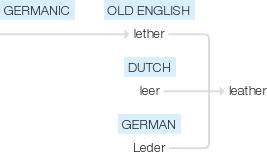Leather
Old English lether, of Germanic origin; related to Dutch leer and German Leder, from an Indo-European root shared by Irish leathar and Welsh lledr .
wiktionary
From Middle English lether, from Old English leþer(“leather”), from Proto-Germanic *leþrą(“leather”), borrowing from Proto-Celtic *ɸlitro-, from Proto-Indo-European *pl̥tro-. Cognate with West Frisian leare(“leather”), Low German Leder(“leather”), Dutch leder, leer(“leather”), German Leder(“leather”), Danish læder(“leather”), Swedish läder(“leather”), Icelandic leður(“leather”).
etymonline
leather (n.)
Old English leðer (only in compounds) "tanned or otherwise dressed hide or skin of an animal," from Proto-Germanic *lethran (source also of Old Norse leðr, Old Frisian lether, Old Saxon lethar, Middle Dutch, Dutch leder, Old High German ledar, German Leder), from PIE *letro- "leather" (source also of Old Irish lethar, Welsh lledr, Breton lezr). As an adjective from early 14c.; it acquired a secondary sense of "sado-masochistic" 1980s, having achieved that status in homosexual jargon in the 1970s.
In commercial and popular usage leather does not include skins dressed with the hair or fur on: such skins are usually distinguished by compounding the word skin with the name of the animal from which they are taken: as sealskin, bearskin, otter skin, etc. In the untanned state skins valued for their fur, hair, or wool and destined to be tawed and dressed for furriers' and analogous uses, are called pelts or peltry. [Century Dictionary, 1900]
